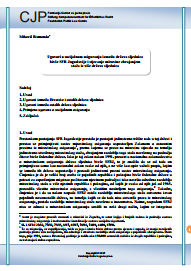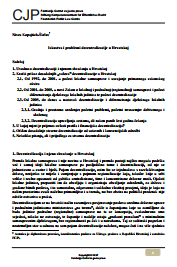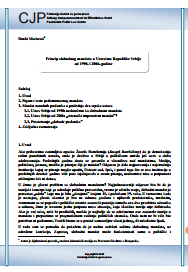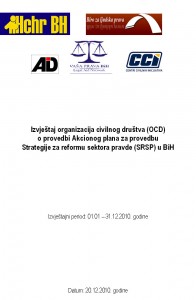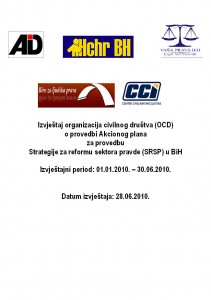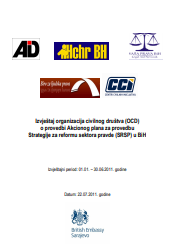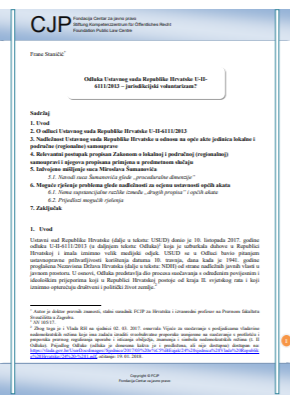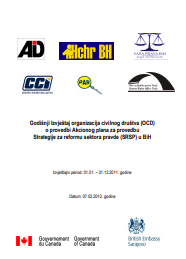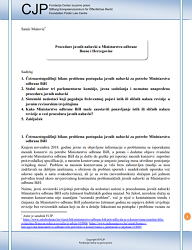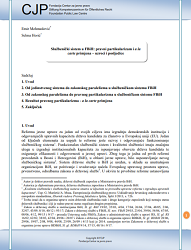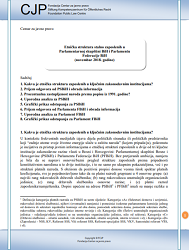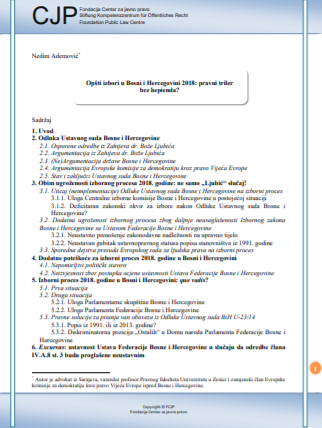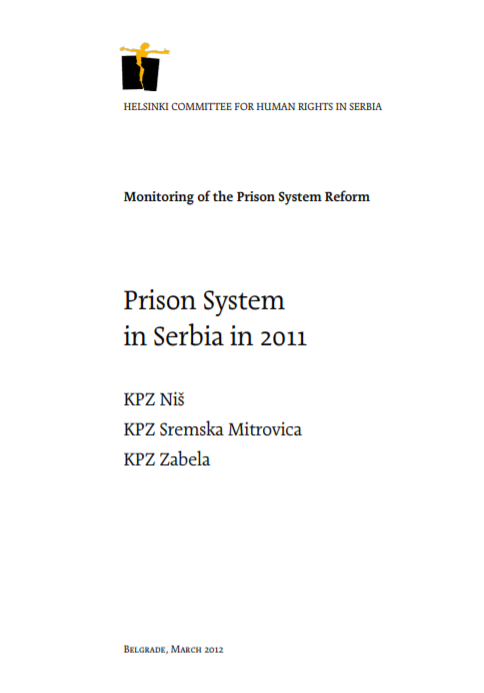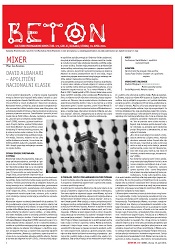Author(s): Author Not Specified / Language(s): Bosnian
In early 2010, the Memorandum on establishing mechanism for monitoring and evaluation of the implementation of the Action Plan of Justice Sector Reform Strategy in Bosnia and Herzegovina (JSRS) was signed by the chair of the Ministerial Conference in BiH and presidents of the High Judicial and Prosecutorial Council BiH and the Judiciary Commission of Brčko District BiH. The established mechanism is unique not only in BiH but also in the surrounding countries. As such, it relies on the best practices of democratic societies of Western Europe in terms of participative monitoring and evaluation of public policies by civil society organizations (hereafter referred to as CSO). The memorandum determined the responsibility of five civil society organizations for systematic monitoring and assessment of the implementation of reform measures and activities of the Action Plan of the Justice Sector Reform Strategy. Those organizations are: Association for Democratic Initiatives – ADI, Helsinki Committee for Human Rights in Bosnia and Herzegovina – HCHR BiH, Association “Your Rights Bosnia and Herzegovina”, Human Rights Office Tuzla and Centres of Civil Initiatives – CCI. In late October 2011, the sixth organization, PAR Excellence Sarajevo, joined the Memorandum and this mechanism of independent monitoring of the implementation of AP JSRS BiH. Relying upon the long-term advocacy experience in the field of democratization and protection of human rights, as well as on the knowledge of issues in the BiH justice sector, these organizations got involved in the process of monitoring, evaluation and reporting on this extremely important reform policy, in order to contribute to an efficient establishment of the justice system in BiH, which is responsible towards all citizens of Bosnia and Herzegovina, fully harmonized with EU standards and best practices, and ensures the rule of law. This is the second annual report on the monitoring and assessment of the implementation of AP JSRS in BiH by partner civil society organizations and it represents an independent assessment of the implementation of reform measures and activities from the JSRS AP by relevant justice sector institutions for the period from January 1 to December 31, 2011. Each organization committed to monitoring the implementation of JSRS within one strategic pillar, which coincides with each organization’s field of work. Therefore, ADI monitors the reform activities related to Pillar 1 – Judicial System; Helsinki Committee for Human Rights in BiH monitors the Pillar 2 – Execution of criminal sanctions; Association “Your Rights Bosnia and Herzegovina” focuses on Pillar 3 – Access to justice; Human Rights Office Tuzla monitors Pillar 4 – Support to economic progress; and CCI analyses the measures within Pillar 5 – Well-managed and coordinated sector. The institutions of the justice sector in BiH entered the third year of implementation of AP JSRS. The overall aggravated political-economic situation in BiH, viewed in close correlation with insufficient human and financial resources and insufficient and inefficient horizontal and vertical sector coordination, made timely and consistent implementation of AP JSRS in BiH even more difficult. That resulted in a rather low overall level of implementation of reforms in BiH justice sector in the previous year. While the issues of complex sector structure, insufficient institutional capacities and restricted budget funds were considered the main causes of slow and limited progress in the previous period, one of the key causes of this situation this year, apart from the abovementioned ones that are evident and constant, are the diametrically opposed stances of the political officeholders in BiH over the status, organisation, structure, jurisdictions, the existing legislative framework and sustainability of certain institutions of BiH justice sector, especially of judiciary institutions on the state level of BiH. Previously expressed declarative political support has now turned into an open political resistance, in consequence of which, crucial reforms in BiH justice sectors are being “put on hold” and the focus was redirected at launching initiatives and conducting exhausting debates about demands of political representatives of the Republic of Srpska for the revision of the previous reform achievements by returning them to the previous state. It was assumed that the consensus reached during the development and adoption of the Justice Sector Reform Strategy in BiH would present a certain incentive to the representatives of executive, legislative and judicial authority in BiH to approach the implementation of these reforms in a coordinated and intensified way. It was also assumed that the established mechanisms for the implementation of the JSRS AP would motivate the justice sector institutions to invest additional efforts with the aim of timely and consistent implementation. However, it can be stated that that has not happened, not even after three years of the implementation. The proactive engagement by all members of the Technical Secretariat for the monitoring of the implementation of the JSRS AP in BiH (TS JSRS) is still missing and is usually limited to activities that are almost always performed during the TS meetings (i.e. once in three months). On the other hand, the technical and administrative activities are still mostly done by the Sector for Strategic Planning, Aid Coordination and European Integration of BiH MoJ (SSPACEI). In that respect, it is most likely that in the event of discontinuation of SSPACEI’s commitment to this process, the entire system of monitoring the implementation of JSRS AP at the sector level might collapse since it currently functions mostly owing to the abovementioned Sector of BiH MoJ. With the exception of the last cycle of FWG meetings when a certain progress was noticed, in the previous three quarterly cycles of meetings of each FWG, the representatives of certain institutions in each of the five FWGs continually did not attend the meetings and participate actively. As a result, the degree of implementation of AP JSRS is constantly decreasing and additional slowdown was noticed in 2011. The report of the European Commission on the progress in BiH in 2011 , among other things, states: “Overall lack of political will and appropriate planning continues to impede the efficient implementation of the Justice Sector Reform Strategy (JSRS) for the period 2009-2013. Shortcomings involve insufficient distribution of human and financial resources and generally poor coordination between relevant institutions. “, as well as that it is: „(...) It is necessary to speed up the implementation of the Justice Sector Reform Strategy.(...)“. Even though the CSOs independent reports, the reports of the justice sector institutions and the conclusions of the Ministerial Conference continually point at the almost identical key problems and obstacles, it is worrying that very little is done in practice to overcome those problems and implement the conclusions of the Ministerial Conference (MC). That represents an additional potential risk that may devalue the credibility as well as the very purpose of sustaining the MC. By analysing the progress achieved in the previous reporting period in each of the strategic areas, the conclusion arises that reforms, due to the increasing lack of political will, are still almost exclusively conducted on the operational-technical level, meaning that the programs and activities that are considered less “politically sensitive” are those that are being implemented, which results in a very limited overall progress. In addition to that, one cannot resist the impression that even in those areas where certain level of progress is noticable, such programs and activities are mostly implemented as part of a certain donor project in the justice sector and therefore the credits for their complete or partial realization could not exclusively be assigned to justice sector institutions. Moreover, this may also be an indication that the institutional ownership of JSRS is still insufficiently developed. In addition to that, by analysing the reports of the TS JSRS, the conclusion is reached that there is no harmonized degree of their realisation on the level of BiH, entities, cantons and Brčko District BiH (e.g. the FBiH sector of criminal sanction execution is lagging behind the RS sector). If this continues, those levels of authority in BiH that are continuously not committed to the implementation of the JSRS AP programs and activities will slow down the coordinated implementation of the reform as a result. Also, they will disrupt the coherency of the entire BiH justice system and the principles of the equal treatment and approach to the efficient justice for all citizens on the entire BiH territory. Taking all of this into consideration, it is quite likely that the final deadline for the full implementation of JSRS, the end of 2013, will be impossible to meet and that the prolongation of the realization of numerous programs and activities by revising AP JSRS is inevitable. It is evident that the existing budgets of justice sector institutions are scarce and insufficient for the implementation of such complex Strategy. The additional aggravating circumstance is the decision of the group of donors (Swedish International Development Agency (SIDA), the British Embassy to BiH and the Spanish Agency for International Cooperation and Development (AECID)) about the withdrawal from the initiative of establishing a joint donor fund for the support to the implementation of AP JSRS in BiH. In consequence of the unjustifiably long process of consideration and decision-making by the members of executive authority in BiH to the Memorandum on establishing the JSRS Donor Fund, the group of the abovementioned donors decided to withdraw from this initiative during the third quarter of 2011. Taking into consideration the overall reduction of donor funds available to BiH and to the BiH justice sector as well, as a result of redirecting the donor community priorities to financing other countries but also as a result of the global economic crisis, it is needless to emphasize the size of the contribution that this donator fund would have made in terms of compensating for fairly limited budget funds necessary for the implementation of the ambitious plan of the justice sector reform in BiH. In the light of these circumstances, it is recommended that the 7th Ministerial Conference and the president of the HJPC BiH and JC BD adopt the conclusion and deliver it promptly to the Fiscal Council of BiH in order for it to consider the possibility that the Document on Global Framework of Fiscal Balance and Policies in BiH for 2012-2014 includes the need for ensuring additional financial means in BiH justice sector, and especially the need for ensuring additional funds for financing priority JSRS programs and activities to an extent that is sufficient for at least a partial compensation for those funds that had been ensured by donators in previous years. Finally, it is important to emphasize that starting the EU-BiH Structured Dialogue on Justice Reform in June 2011 resulted in a certain degree of relaxation of political relations in BiH justice sector. Two meetings have been held by now and their outcome leaves some space for mild optimism that a more constructive discussion between all key participants could take place in the following period about all shortcomings in the justice sector as well as that the conditions set to the justice sector in the process of joining the EU could be fulfilled by coordinated finding of joint solutions based on compromises. Even though the six partner CSOs did not take part at the previous two meetings of EU-BiH Structured Dialogue on Justice, two consultation meetings were held (November 3, 2011 and December 19, 2011) at the invitation of the representatives of the EU Delegation in BiH. The EU Delegation representatives presented a set of recommendations from previous meetings and gave an opportunity to partner CSOs to give their comments and suggestions. Also, the EU Delegation representatives invited the representatives of six partner CSOs to become included in this process starting from the next meeting that is planned to take place in late March 2012. At the same time, the representatives of six partner CSOs committed to transferring and promoting all relevant information on EUBiH Structured Dialogue and also to representing views of other civil society organizations active in BiH justice sector in connection to this process. In that respect, it was agreed that the EU Delegation in BiH and the representatives of six partner CSOs should ask from justice sector institutions to adopt this initiative at the upcoming Justice Sector Ministerial Conference and that the representatives of CSOs become invited to participate in this process starting from the first following meeting. Recommendations related to the Strategic Pillar 1 – Judicial System: 1. Taking into consideration the recommendations from the second meeting of the Structured Dialogue, it is necessary to urgently make changes to the existing AP JSRS and add new activities, the implementation of which will result in the realization of the mentioned recommendations; 2. In order to implement the recommendation of the EU for the institutional reform of the appellate system in the Court of BiH, new strategic program should be included in the strategic subfield 1.1. – Independence and harmonization; 3. Also, concerning the implementation of the recommendation of the EU for reducing a large number of unsolved old cases about the transfer of contentious probate cases to notaries, it is necessary to include new strategic program in the strategic subfield 1.2. - Efficiency; 4. It is necessary to intensify efforts by Federal Justice Ministries for adoption of the Law on Prosecution of Federation of BiH and, in addition to holding a thematic conference and consultations with the cantonal MJ, to start activities around alignment of attitudes of cantonal MJs about the transfer of jurisdictions from cantonal MJ to FMJ in terms of financing and establishing a unified Law on Prosecution on the level of the Federation BiH; 5. Concerning the alignment of the principles of the program budget in all judiciary institutions in accordance with the existing guidelines that are given to all institutions, it is necessary to monitor the application of those guidelines by HJPC and provide technical support and staff education in order to further support their implementation through cooperation of HJPC and CEST; 6. In accordance with the analysis of existing capacities of institutions in budget preparation and execution, it is necessary to begin the amendments to the existing rulebooks on the systematisation of workplaces and plan adequate funds in budgets of the institutions in order to ensure adequate human resources in the upcoming period; 7. In relation to reducing a large number of unsolved cases prior to amending the existing ones or passing new regulations in the Law on Enforcement Procedure related to the position, role and status of the court executor, it is necessary to ensure the passing of a certain number of amendments to the existing Law on HJPC; 8. In terms of reducing the number of unsolved cases related to the execution of legally binding judgements, it is necessary to find a way to ensure budget funds for their execution; 9. It is necessary to urgently work on completing the current system for electronic filing of small claims and ensure that representatives of communal companies, in addition to courts, have access to the system; 10. Prior to making a decision on the establishment of new courts and prosecutor’s offices, it is necessary to first reassess the existing organizational structure and start strengthening the capacities of the existing courts and prosecutor’s offices by increasing the number of judges and prosecutors and to start the formation of new organizational units only if that is not possible; 11. In order to ensure adequate material and technical conditions for the functioning of courts and prosecutor’s offices, it is necessary to urgently update the existing architectural-technical plans in order to determine what is necessary for their reconstruction; 12. It is necessary to ensure that when transferring/adding new jurisdictions from AP JSRS to CESTs that adequate budget funds necessary for additional training are provided. Recommendations related to the Strategic Pillar 2 – Execution of Criminal Sanctions: It is recommended: 13. to the Parliament of the Federation BiH to speed up the procedure of passing the Law on Execution of Criminal Sanctions; 14. to the MJ FBiH to increase measures for making and passing regulations with the aim of ensuring an increased application of community service and other types of alternative punishments and of ensuring materialtechnical conditions; 15. to the MJ RS to increase efforts and provide funds for equipping and human resourcing with the aim of putting into function the Special Hospital for Forensic Psychiatry in Sokoc; 16. to MJ BiH to invest additional efforts, through the Implementation Unit, in order to speed up the realization of this important project; 17. to entity MJs to speed up processes of establishing entity administration departments; 18. to the MJ BiH to speed up the harmonization of attitudes and start the making and passing of the joint plan of financing heath protection of prisoners in cooperation with the ministries of heath. Recommendations related to the Strategic Pillar 3 – Access to Justice: 19. The Association “Your Rights Bosnia and Herzegovina” recommends taking more efficient measures for the implementation of the Action Plan by carriers of certain strategic programs/activities, by reinforcing the coordination between the state carriers of activities and entity and cantonal institutions and Brčko District. It is necessary that the ministries of justice of entities and cantonal ministries as well as JC BD become more actively involved in the implementation of the Action Plan, include strategic programs and activities in their work program, which would create a stronger obligation for the implementation. 20. Regarding the Framework Law on Free Legal Aid, it is necessary to influence the authorities in BiH to adopt that law with the aim of ensuring equal rights of citizens on the entire BiH territory. 21. To influence the passing of cantonal laws on free legal aid in those cantons that do not have this law, 22. To ensure the alignment of the existing regulations or passing new ones in order to provide the access to free legal aid to as many citizens as possible, 23. To ensure that the passing of the Law on Free Legal Aid establishes an independent body or board for providing aid on the entire BiH territory. The representatives of associations specialized for providing free legal aid would also be included in the independent body, 24. In an adequate way ensure that legal help is provided by independent organs, including lawyers and associations specialized for providing free legal aid; 25. Concerning the structured dialogue, to ask from institutions of the justice sector to include six partner civil society organizations in the process of structured dialogue about the judicial system, 26. In parallel with development of standards of work with court users, it is also necessary for HJPC to develop an efficient system for monitoring their application and compose a guidebook with accompanying annexes for each service, with the aim of improving the quality of service provided by courts, establishing the system of monitoring the fulfilment of standards as the control of quality of court services. 27. In the following period, to increase activities of OCDs in monitoring the implementation of AP JSRS in BiH by collecting information from individual sources, such as the Court of Bosnia and Herzegovina, courts in both entities, Centre for Legal Aid of the Republic of Srpska, CEST of the Federation of Bosnia and Herzegovina and the Republic of Srpska, EU Delegation, OHR/EUSR. Recommendations related to the Strategic Pillar 4 – Support to Economic Growth: 28. To ensure sufficient financial funds in entity budgets in 2012 for consistent implementation of the action plan for strategic area 4 – supporting economic growth, 29. To complete the analysis on the necessary alterations of the court systems, making and implementation of the full implementation plan on the basis of questionnaires completed by judges and lawyers and present it to all key actors in the justice sector, including the representatives of the civil society in BiH in order to give them an opportunity to give their comments and suggestions, 30. To promptly appoint persons in charge of mediation, coordination and monitoring of the activity of mediation in all entity ministries of justice, 31. To ensure political will for passing the set of laws on the level of the FBiH (Law on Property Rights FBiH, Law on Cadastre FBiH, Law on Amendments to the Law on Land Registry FBiH) which will enable a more efficient reform of land administration, 32. To adopt the strategies and policies in the area of land administration that are a condition for approving financial funds for the continuation of the reform of land administration; 33. Technical department for monitoring the implementation of AP JSRS to consider and incorporate into the new revised AP JSRS the recommendations of civil society organizations contained in the annual report of CSO on the monitoring of the implementation of AP JSRS. Recommendations related to the Strategic Pillar 5 – Well-Managed and Coordinated Sector: 34. CCI again appeals to the ministers in the BiH justice sector to take full responsibility for a consistent realization of assumed reform obligations that are stated in the AP JSRS and other strategic documents relevant to the justice sector, which is significant for further progress of our country toward the EU. 35. All institutions in the justice sector in BiH, including cantonal justice ministries, should be included in EU-BiH structured dialogue on the judicial system, especially if taking into account their jurisdictions and responsibilities for the functioning of the judicial system in FBiH. In addition to that, the process of structural dialogue has to be depoliticized and a much larger involvement of key judicial institutions in BiH, primarily of HJPC BiH, has to be enabled, in order to avoid the possibility of further jeopardizing the independence of the judiciary system in BiH. 36. It is recommended that the request of the representatives of six partner CSOs for becoming included in the process of the EU-BiH structured dialogue on justice reform should be approved at the 7th Justice Sector Ministerial Conference scheduled for February 28, 2011. Also, it is recommended to invite the six partner CSOs to participate in this process starting from the following meeting planned for late March 2012. 37. It is recommended that the 7th Justice Sector Ministerial Conference adopt the conclusion and deliver it to the Fiscal Council of BiH in order for it to determine the need in the Document on Global Framework of Fiscal Balance and Politics in BiH for 2012-2014 for ensuring additional financial means in BiH justice sector, and especially the need for ensuring additional funds for financing priority JSRS programs and activities to an extent that is sufficient for at least a partial compensation for those funds that had been ensured by donators in previous years. 38. It is necessary that the Federal Ministry of Justice, in accordance with the FBiH Government Decree on the process of strategic planning, annual planning and reporting in federal ministries, makes a three-year institutional strategic plan within which it will take over measures and activities from AP JSRS. Concerning the RS Ministry of Justice, it is necessary that it keeps pace with the FMoJ and that it passes its institutional strategic plan which would also be aligned with AP JSRS in BiH. Cantonal justice ministries and JC BD BiH have to update their institutional strategic plan in accordance with the third revised AP JSRS, drafts of which are made within the project of technical assistance of the Spanish Agency for International Cooperation and Development (AECID) and to formally adopt them by the end of March 2012 at the latest. All mentioned institutions should ensure a close connection between their strategic plans and budget framework documents, and ensure that operative plans are timely and consistently transferred to the annual work plans of each of the mentioned institutions. 39. Federal Ministry of Justice has to intensify activities on human resourcing of the Sector for Strategic Planning. Simultaneously, RS MoJ, JC of BD BiH should amend their rulebooks on internal organization with the aim of establishing internal organizational units or at least some workplaces for strategic planning, monitoring and reporting. Introducing the system of institutional strategic planning should be completely integrated or at least closely connected with the process of program budgeting. 40. It is necessary to intensify the activities of the policy forum between BiH MoJ and the HJPC of BiH Secretariat and to include in its work entity and cantonal ministries of justice and representatives of JC of BD BiH in their full capacity. 41. In accordance with the requirements of the Public Administration Reform Strategy in BiH, it is necessary that MoJ BiH, FMoJ, MoJ RS, cantonal MoJs and JC BD BiH make an analysis of their exiting organisational and staff capacities for policy-making and to ensure the establishing of the most appropriate organisational structure for performing those tasks on the basis of that analysis (depending on the scope of work and personnel available for performing that task). Then, on the basis of the analysis, each ministry should amend its rulebook on internal organization and job systematisation in order to establish suitable internal organisational structure or individual work places for performing that task, along with determining suitable job descriptions. Taking into account the ever-present budget restrictions in terms of impossibility of employing new civil servants and with the aim of avoiding possible additional accumulation of administration, it is recommended that the filling of these work positions should be done by internal transfers and/or amendments to the workplace description of the existing civil servants who already partially do this work as part or in parallel with their regular assignments. Only when conducted analyses argumentatively point to the impossibility of these solutions, ministries should start employing new personnel. The methodology of development of public policies, including policy impact assessment, should be developed in parallel with these activities. With the aim of achieving coherency of the solution on the level of the sector, the optimal solution would be a unified methodology that could afterwards be transposed in each institution of the justice sector by an internal act (e.g. a rulebook). The Decree of the Government of the Federation on the way of preparation, impact assessment and policy selection in the process of the making of acts proposed and passed by the Government of the FBiH and federal ministries (“Official Gazette FBiH” number 35/11) could serve as a model for the making of this methodology. Also, considering the complexity of the process of policy development and impact assessment, it is recommended that a suitable handbook be made as part of the methodology and also to ensure additional specialised training and mentorship to the appointed personnel at the ministries with the aim of deepening their technical knowledge and skills needed for performing these tasks. It is evident that institutions of the justice sector in BiH will not be able to implement all these activities alone and it seems justified that a suitable technical support be ensured by bilateral and multilateral donors active in the justice sector in BiH. 42. It is necessary to finally open a question and, with an utterly serious and responsible approach, start solving the issue of restructuring cantonal ministries of justice and administration2 and through conversations between representatives of relevant institutions and political leaders to avoid politisation of this important process, which will certainly contribute to the better implementation of JSRS. In this respect, it is recommended that the 7th MC adopts the conclusion by which the issue of restructuring cantonal ministries will be discussed at one of the upcoming thematic conferences, in the presence of all ministers and other persons who are included in the process of implementation of JSRS, which will strengthen the initiative for prompt solving of this important issue. 43. It is necessary to start activities for strengthening the capacities in BiH MoJ, in their departments in FMJ, MJ RS and JC BD BiH in the field of approximation of BiH justice sector legislation with the EU Acquis Communautaire, which should be one of the priorities in the implementation of JSRS AP. Recommendations related to the quality of the monitoring of the implementation of the Action Plan JSRS: Consistent and timely implementation of the Action Plan for the implementation of the JSRS in BiH urgently requires: 44. With the aim of overcoming noticed shortcomings in the process of monitoring and reporting on the realisation of AP JSRS, it is recommended that the 7th MC adopts the conclusion by which it will oblige all institutional carriers of the process of monitoring and reporting on the realisation of the AP JSRS in BiH to participate in the training on practical aspects of the application of OWIS system of monitoring and reporting that would be organized by USAID JSDP II project. 45. Ministries of justice in BiH and entities, HJPC and JC BD should invest maximum effort in order for Technical Department for monitoring the implementation of AP JSRS in BiH (TD) to finally start functioning in its full capacity, which implies allocation of larger financial funds necessary for the work of the TD, changing its structure of members, including the replacement of passive institutional members who cannot take full responsibility for assumed obligations in the context of a more efficient implementation of JSRS. 46. Even though the conclusions of the MC are binding and have to be fulfilled in the given time period and SSPACEI has to be notified on their implementation, the level of their implementation is still low and those conclusions are very often repeated. If a certain institution does not implement a certain conclusion of the MC, it has to provide the reason for that at the following MC and the MC has to conduct a debate and determine a suitable countermeasure for a consistent implementation of its conclusion. Otherwise, it could happen that credibility and the purpose itself of this body is “devalued”. 47. It is necessary to ensure active participation of all members of functional workgroups during scheduled meetings because it is unacceptable that meetings of FWG are held with a quorum barely being present. The FWG 5 had a quorum at several previous meetings, there were no postponements of the meetings, but it is evident that the representatives of the MJ RS do not attend those meetings. One of the main causes of this situation is a chronic lack of capacities in most institutions. By redistribution of the existing capacities and by more efficient planning and coordination within those institutions, shortcomings can be overcome, at least in the shortterm. 48. It is necessary to significantly improve vertical coordination and cooperation between the Federal Ministry of Justice and cantonal ministries of justice, which still represents one of key obstacles in proper implementation of JSRS in BiH. It is evident that, regardless of the existing jurisdictions of those institutions, their cooperation should be much better. 49. There is a continuous need for establishing a better coordination and exchange of information within institutions that are included in the process of the implementation of JSRS, especially on the level of cabinets of assistants of ministers, secretaries of the ministries and between all relevant sectors for a more efficient implementation of JSRS in BiH. In that regard, all ministries of justice should pass special internal acts or amend the existing ones within which they could develop mechanisms of inter-institutional cooperation, coordination and information exchange. CONCLUSION Despite pronounced political tensions in the justice sector in BiH in the past twelve months, certain progress has still been noticed in each of the strategic areas of JSRS. However, the fact remains that much more could have been done in this time period. With gradual relaxation of political tensions triggered by the start of the EU-BiH structured dialogue on the future of the judicial system in BiH, the hope remains that the current course will change and that the reform process that will contribute to progress in the implementation of AP JSRS will intensify. It is crucial that the 7th MC sends a clear message to all local institutions and BH public that consistent and timely implementation of AP JSRS is the only way if BiH justice sector really wants to contribute to the building of the European future for BiH citizens. Otherwise, each further lack of dedication, unequivocal support and constructive approach to the realization of the Action Plan of the Justice Sector Reform Strategy in BiH will present a setback in the process of achieving strategic aims and satisfying growing demands for the rule of law and equal approach to efficient justice for all BiH citizens. Civil society organizations will, in partnership with relevant representatives of government and non-governmental sector in BiH, continue to implement systematic and continuous monitoring, analysis, reporting, and public advocating. Also, they will continue to, through full participative role in decision-making process, give substantial contribution to consistent and timely implementation of AP JSRS with the aim of establishing and functioning of the justice system in BiH as an incentive for a more intense economic growth, rule of law and respecting the highest standards of human rights protection and freedom for all citizens of BiH.
More...
